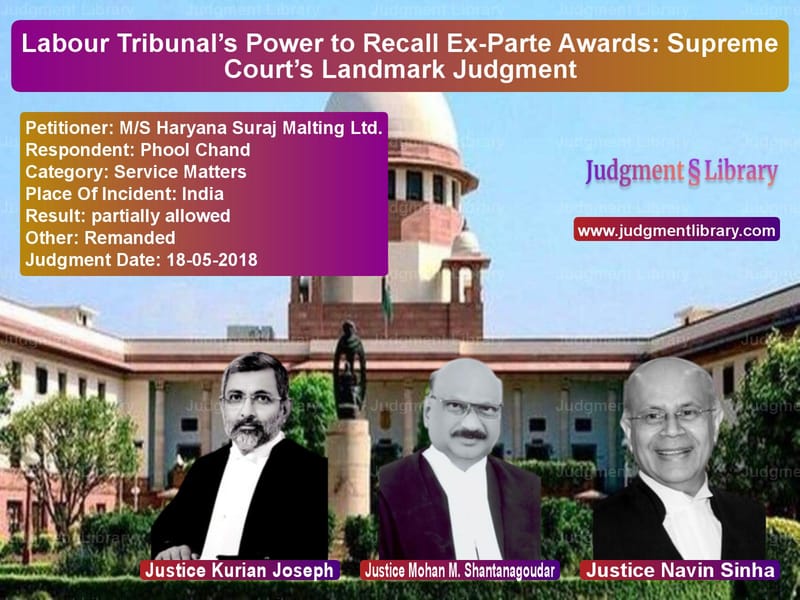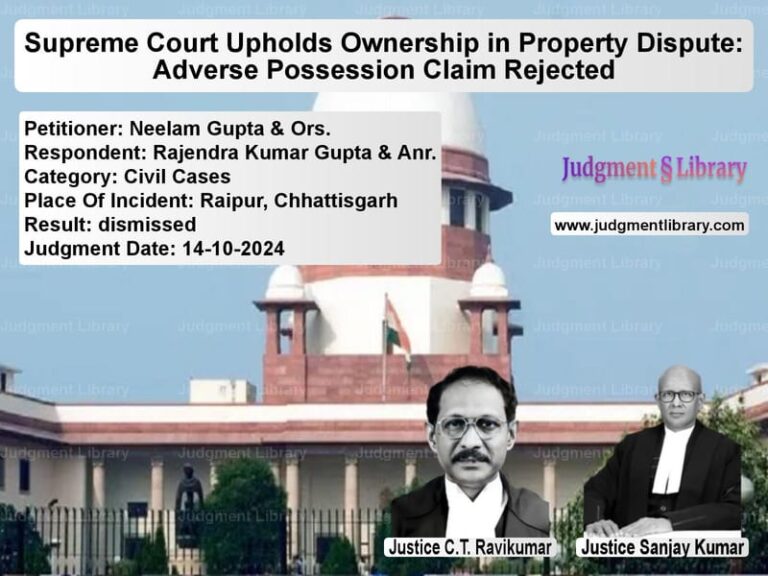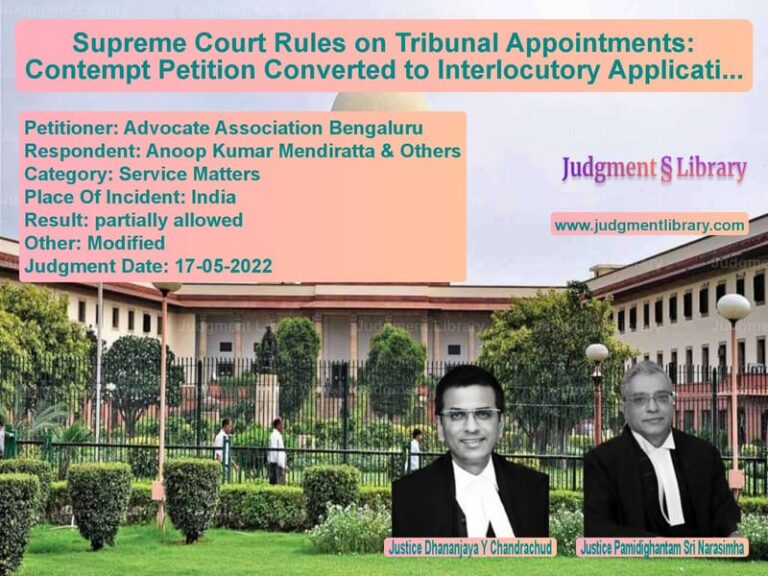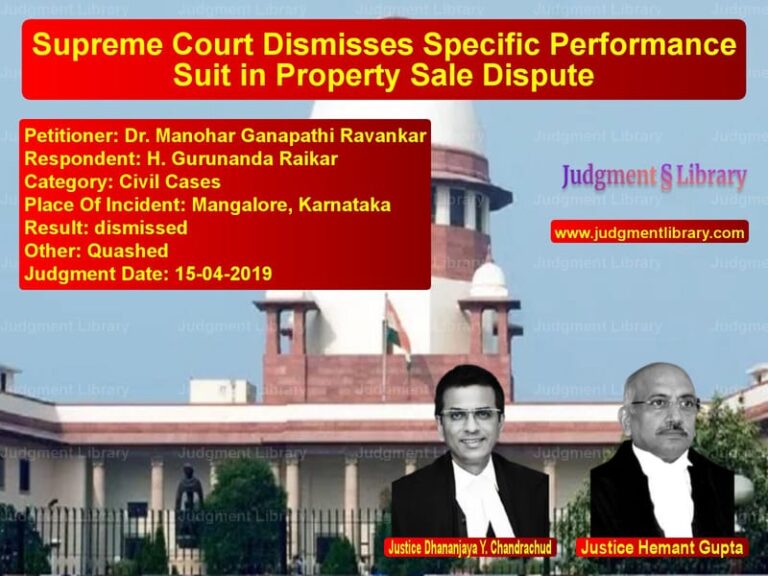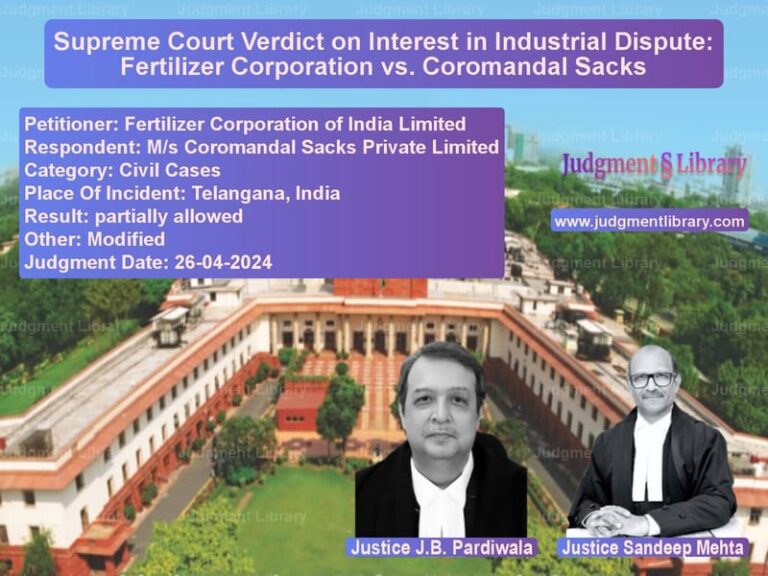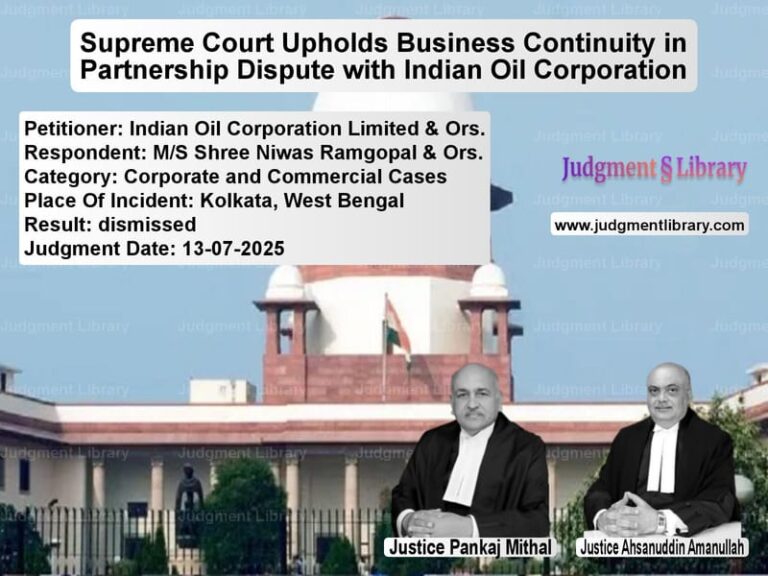Labour Tribunal’s Power to Recall Ex-Parte Awards: Supreme Court’s Landmark Judgment
The case of M/S Haryana Suraj Malting Ltd. v. Phool Chand addressed a significant question in labor law: Whether the Industrial Tribunal or Labour Court retains the authority to set aside an ex-parte award after it has become enforceable. The Supreme Court clarified this issue by analyzing previous conflicting judgments and reaffirming the principles of natural justice.
The case arose from an ex-parte award granted in favor of the respondent, Phool Chand, which the appellant, M/S Haryana Suraj Malting Ltd., sought to challenge after 30 days of its publication. The Tribunal had refused to entertain the recall application on the grounds that it was functus officio (i.e., it had exhausted its jurisdiction). The matter eventually reached the Supreme Court due to conflicting precedents.
Background and Legal Issues
The primary issue in this case was whether a Labour Court or Tribunal could entertain an application to recall an ex-parte award once the award had become enforceable under Section 17A of the Industrial Disputes Act, 1947.
The relevant provisions of the Industrial Disputes Act are:
- Section 17: An award must be published by the appropriate government within 30 days of receipt.
- Section 17A: An award becomes enforceable on the expiry of 30 days from its publication.
- Section 20(3): Proceedings before a Tribunal are deemed to conclude on the date the award becomes enforceable.
The Supreme Court had to decide:
- Whether an Industrial Tribunal or Labour Court is functus officio after 30 days from the publication of an award.
- Whether an ex-parte award can be set aside even after the statutory period has elapsed.
- Whether the principle of natural justice allows a Tribunal to reconsider an ex-parte award if sufficient cause is shown.
Arguments by the Petitioner
The petitioner, M/S Haryana Suraj Malting Ltd., contended that the Tribunal had the inherent power to recall its own order if it was passed ex-parte due to justifiable reasons. The key arguments presented were:
- An ex-parte award should not attain finality if the party was unable to appear due to valid reasons.
- The principle of natural justice demands that no party should be condemned unheard.
- The Tribunal’s powers include the ability to correct its own mistakes and provide fair opportunity to both parties.
- Refusal to reconsider an ex-parte award can result in grave injustice.
Arguments by the Respondent
The respondent, Phool Chand, countered the petitioner’s claims by arguing that:
- The Industrial Disputes Act provides clear guidelines regarding the enforceability of an award.
- Allowing a Tribunal to recall an ex-parte award indefinitely would disrupt the finality of dispute resolutions.
- The petitioner had ample opportunity to contest the claim during the proceedings but failed to do so.
- Since the statutory period had expired, the Tribunal had lost jurisdiction over the matter.
Supreme Court’s Observations
The Supreme Court extensively analyzed previous case law, including:
- Grindlays Bank Ltd. v. Central Govt. Industrial Tribunal – The Court recognized that the Tribunal had the power to set aside an ex-parte award in the interest of justice.
- Anil Sood v. Labour Court – The judgment upheld the principle that a Tribunal is not necessarily functus officio after 30 days.
- Kapra Mazdoor Ekta Union v. Birla Cotton Spinning and Weaving Mills Ltd. – Distinguished between procedural review and review on merits, affirming the right to procedural fairness.
The Supreme Court observed:
“If a party is in a position to show sufficient cause for its absence before the Labour Court/Tribunal when it was set ex-parte, the Labour Court/Tribunal, in exercise of its ancillary or incidental powers, is competent to entertain such an application.”
Further, the Court emphasized:
“Merely because an award has become enforceable does not necessarily mean that it has become binding. For an award to be binding, it must be passed in compliance with the principles of natural justice.”
Final Judgment
The Supreme Court ruled that:
- The Industrial Tribunal/Labour Court is not functus officio merely because an award has become enforceable.
- An ex-parte award can be recalled even after 30 days if there is sufficient cause for non-appearance.
- Tribunals have inherent powers to correct ex-parte awards to prevent injustice.
- The case should be remitted back to the Tribunal for reconsideration.
The Court also directed that the appellant make a provisional payment of ₹1,00,000 to the workmen, subject to final determination.
This judgment reaffirmed that the principles of natural justice should not be sacrificed for procedural technicalities. It emphasized that the power to recall an ex-parte award exists even after the award becomes enforceable, ensuring fairness in labor dispute resolutions.
Petitioner Name: M/S Haryana Suraj Malting Ltd..Respondent Name: Phool Chand.Judgment By: Justice Kurian Joseph, Justice Mohan M. Shantanagoudar, Justice Navin Sinha.Place Of Incident: India.Judgment Date: 18-05-2018.
Don’t miss out on the full details! Download the complete judgment in PDF format below and gain valuable insights instantly!
Download Judgment: MS Haryana Suraj Ma vs Phool Chand Supreme Court of India Judgment Dated 18-05-2018.pdf
Direct Downlaod Judgment: Direct downlaod this Judgment
See all petitions in Employment Disputes
See all petitions in Disciplinary Proceedings
See all petitions in Termination Cases
See all petitions in Judgment by Kurian Joseph
See all petitions in Judgment by Mohan M. Shantanagoudar
See all petitions in Judgment by Navin Sinha
See all petitions in partially allowed
See all petitions in Remanded
See all petitions in supreme court of India judgments May 2018
See all petitions in 2018 judgments
See all posts in Service Matters Category
See all allowed petitions in Service Matters Category
See all Dismissed petitions in Service Matters Category
See all partially allowed petitions in Service Matters Category

